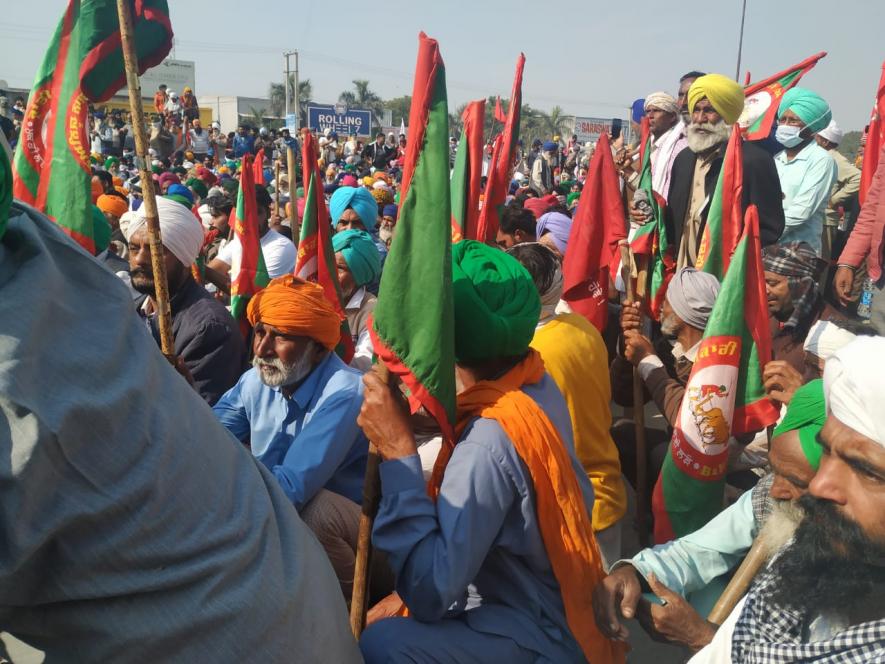Farmers’ Protests: Good Intentions, Mr.Modi? Have a Look at Facts First…

Farmers at Singhu Border on 29th Nov
The central government has been carrying out a campaign – led by Prime Minister Modi himself – that the three new farm laws will remove middlemen, ensure better prices for farmers’ produce and generally improve the condition of India’s vast agrarian community. The laws have been described as a new dawn, a revolution, etc. Faced by a strong farmers movement against these laws, the BJP and its supporters have tried various tactics to first discredit it (by calling participants Khalistani supporters or even not being genuine farmers), and then self-righteously claiming that farmers were being misled by Opposition parties. When farmers started heading towards Delhi, the BJP-led Haryana government was asked to stop them at any cost, which they tried but ignominiously failed at. PM Modi finally opted for the usual melodramatic swearing by the Holy Ganga that his intentions were pure, and that he only wanted to help the farmers.
Since the protest movement continued to grow through all this drama, and thousands of farmers are currently camped on highways entering Delhi, the Modi government has, for the first time, been forced to negotiate with an ongoing mass protest. This is a novel experience for them, and it speaks of the extent to which the government is rattled that they were forced to the table, kicking and screaming, so to speak. After much buzzing around between various bigwigs of the government, the meeting between farmers representatives and two ministers of the Modi Govt. was held on December 1. The rank immaturity and arrogance of the government became clear because all they had to offer was a committee to consider all aspects, which was laughed out of the room by the farmers. They also asked the farmers to give ‘clause by clause’ objections to the laws. Clearly, the government is buying time, because its bottom line is still this: the laws will not be repealed, which is the single demand of the farmers.
While another round of talks is fixed for December 3, the BJP propaganda about the benefits of these laws continues unabated through mainstream media and through social media channels. What the Modi government refuses to see or believe is that the farmers are not misled or under any misapprehensions. They know what these laws mean, and for them, it is a matter of life and death.
Here Is What Happens When APMCs Are Scrapped
Bihar is a living example of what happens when state-run APMCs are scrapped and a so-called ‘free market’ regime is put in place for buying and selling of agri-produce. Under Nitish Kumar’s stewardship, Bihar government had scrapped its Agricultural Produce Marketing Committee (APMC) Act way back in 2006. The arguments were the same: it would lead to increased private investment in agricultural infrastructure, better prices for farmers and an end to middle men. Here’s what happened then.
Farmers’ have been invariably forced to sell their produce at prices much below government declared MSP. There is high degree of price volatility. Government procurement is shockingly low. Wholesale markets for food grain and fruits and vegetables are privately run, without any required infrastructure, with farmers at the mercy of cartelised big traders.
The charts below show that less than 20% of paddy and often zero per cent of wheat has been procured by government agencies. Data is from the central government’s Department of Food and Public Distribution (DFPD) publications.
All reports suggest that farmers invariably sell their produce below the fixed MSP. In 2019-20, MSP was for rice was fixed at Rs 1,815 per quintal but farmers were forced to sell to traders at only Rs 1,350 to 1400 per quintal. For wheat, MSP was Rs 1,925 but farmers had to sell it at Rs 1,800 or even less. For maize, farmers reported getting a price of Rs 1,000-1,300 per quintal while the official MSP was fixed at Rs 1,850 in the current year.
According to reports, the number of government-run grain procurement centres had gone down from about 9,000 in 2015-16, to 1,619 in 2019-20. This was presumably done to allow big agri-business and food processing companies (like biscuit makers) to buy up the grain. Rather than getting higher prices, farmers are just selling to traders, who mostly offered prices below MSP. Unconcerned about low prices for farmers, the then deputy chief minister and BJP leader Sushil Modi proudly said, “It is (through a) direct marketing module approach that ITC, makers of Ashirwad flour, is procuring 2-3 lakh metric tonnes of wheat yearly directly from farmers”.
Deregulated Fruit & Vegetable Markets
It is not just farmers producing wheat, paddy or maize etc. that suffer when the government deregulates agricultural commodity trade and allows ‘market forces’ to rule. It was hoped that in Bihar – the country’s third largest producer of fruits and vegetables (F&V) after Uttar Pradesh and W. Bengal – the private sector would set up wholesale markets and cold-chain infrastructure. Nothing of the sort happened.
According to one expert analysis based on surveys, private traders set up roadside wholesale markets in all major fruit and vegetable pockets of the State, charging a two per cent fee from farmers and a lot-based fee from buyers. There are no weighing scales or bridges, no sheds or records, no regulation of quality or prices. Farmers saved on transport costs but lost on market fees and prices which were fixed by traders.
Govt. Studies Showed Disastrous Impact
In a study published in November 2019, the National Council of Applied Economic Research (NCAER) pointed out that agricultural growth in Bihar decelerated to a mere 1.3% per annum during 2012-13 to 2016-17, compared to three per cent between 2008-09 and 2011-12, and two per cent between 2000-01 and 2007-08. This is what the report had to say about the causes of this crisis:
“Despite the abolition of the Agricultural Produce Market Committee (APMC) Act in 2006, private investment in the creation of new markets and strengthening of facilities in the existing ones did not take place in Bihar, leading to low market density. Further, the participation of government agencies in procurement and the scale of procurement of grains continue to be low. Thus, farmers are left to the mercy of traders who unscrupulously fix lower prices for agricultural produce that they buy from farmers. Inadequate market facilities and institutional arrangements are responsible for low price realisation and instability in prices.”
Another study on Bihar’s post APMC abolition scenario was done by the government-run National Institute of Agricultural Marketing (NIAM) in 2011-12. It came to the rather reluctant conclusion:
“The step to move towards the free market regime from that of regulatory mechanism has been taken in a right spirit to make the system more efficient and congenial to the farmers. However, the same has created a vacuum in terms of institutional mechanism for administering the functioning of markets. The small-scale farmers have no alternate channels of marketing except to use the current trader dominated system.”
Other Laws Will Add to Harm
The two other laws will cause even more harm to both farmers and consumers. By removing stock limits and price caps on essential food items, the Modi government has opened the way for agri-businesses and traders to hoard key commodities like potatoes or onions, or even wheat and rice, without any limits. They can thus create artificial scarcities, pushing up prices and then sell their stock at super profits.
Recently, in October, when onion prices rose by over 40% in three weeks, the central government had to invoke the Essential Commodities Act to put stock limits so that there was no hoarding. This was done because Bihar elections were round the corner and the government could ill-afford any angry reaction from voters. But in other times, the relaxed limits would be allowed and hoarders would flourish.
The third law allowing contract farming, is meant to again benefit the big agri-business lobby, which wants farmers to cultivate according to their preferences. If they want potatoes (for chips) or tomatoes (for ketchup), that’s what they will give a contract for. Farmers will thus become wage earners on their own land, while essential food grain production may get affected due to the profit seeking by corporate bodies.
The three laws are a complete integrated package, complimenting each other. There is no via media here. The government knows this and so do the farmers
Get the latest reports & analysis with people's perspective on Protests, movements & deep analytical videos, discussions of the current affairs in your Telegram app. Subscribe to NewsClick's Telegram channel & get Real-Time updates on stories, as they get published on our website.
























